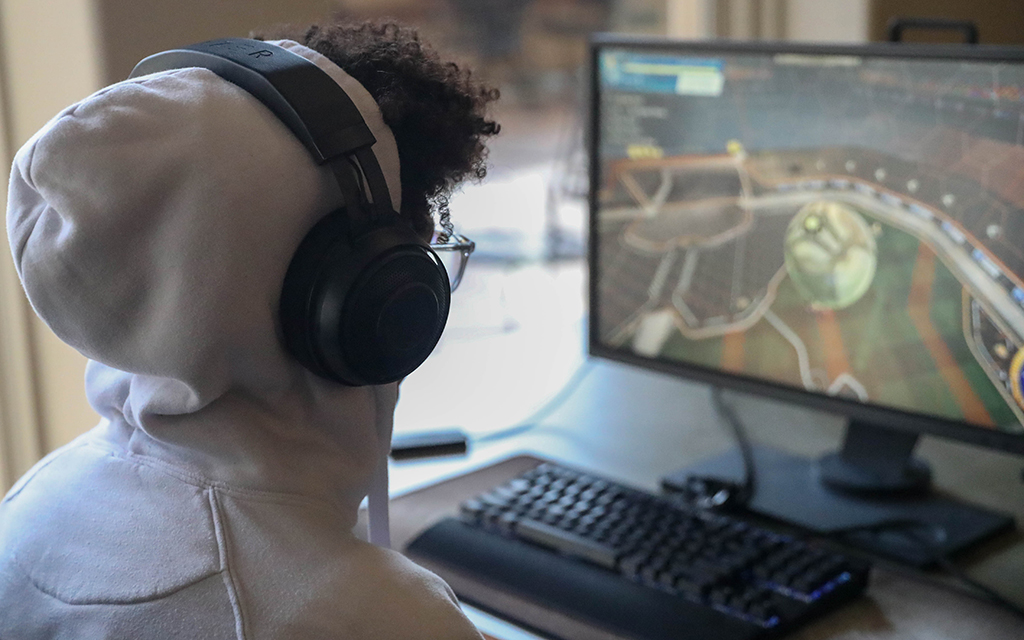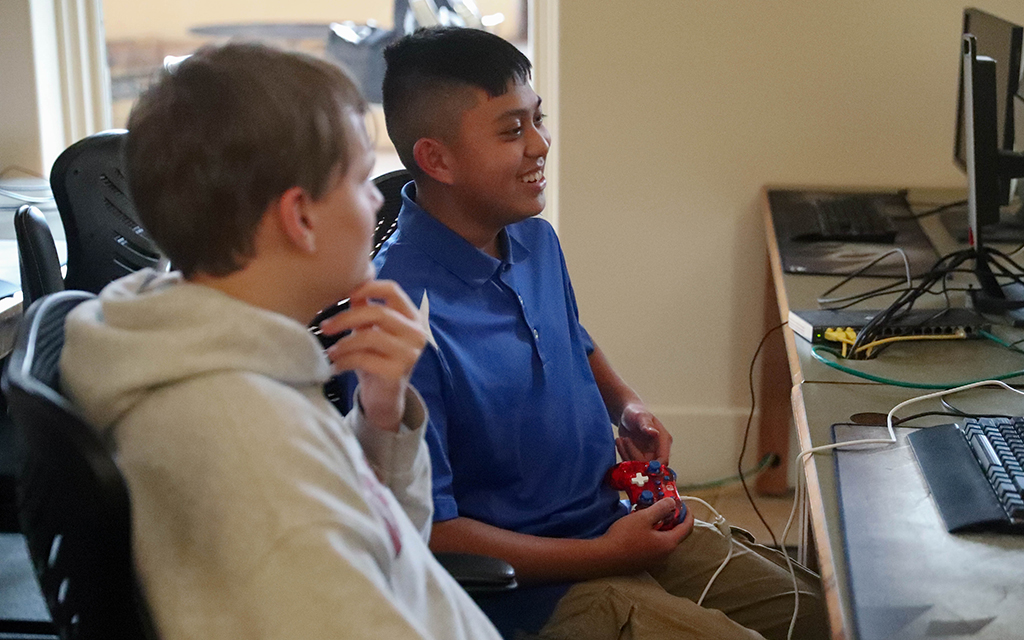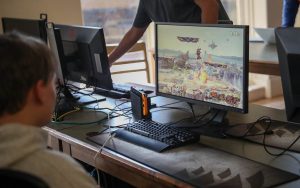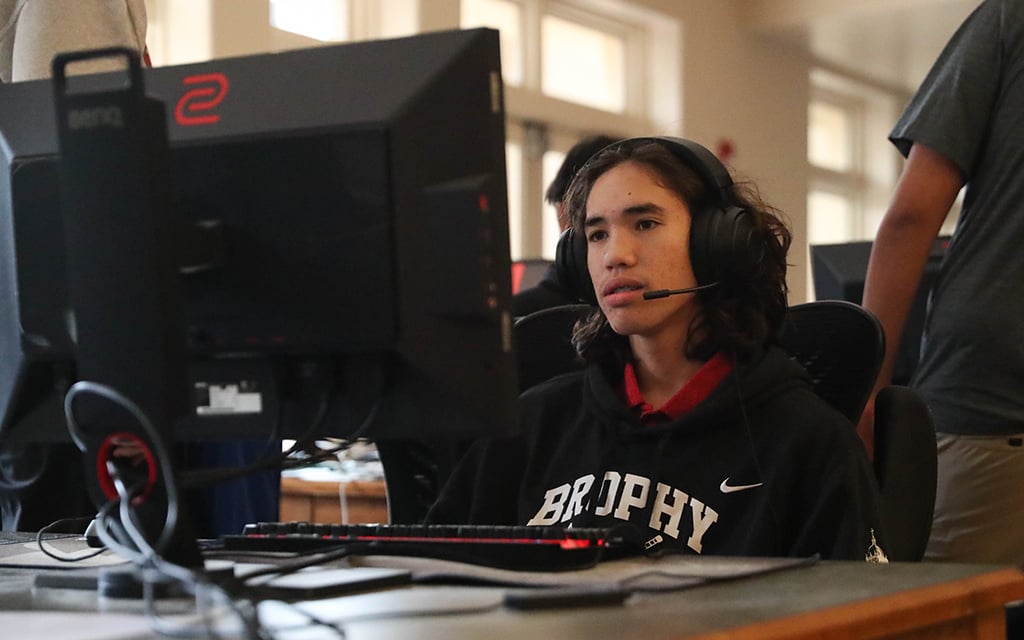
Students from various high schools across Arizona prepare their gaming setups as they anticipate the start of the fifth season of esports competition. (Photo by Daniella Trujillo/Cronkite News)

Arizona high school students immerse themselves in the world of competitive gaming as esports becomes an integral part of extracurricular activities. (Photo by Daniella Trujillo/Cronkite News)
PHOENIX – A sport once thought to be nothing more than a hobby is growing rapidly throughout Arizona, and the state’s high school esports teams are preparing to begin their fifth season of competition Tuesday.
With the growth, new esports have popped up along the way. First-person shooting games such as “Valorant” and “Overwatch” are becoming more popular among teenagers. As a result, college programs, esports coaches and league officials must navigate how to add esports which resonate with players into the lineup while avoiding the promotion of violence.
“It seems to be growing every year,” said Brian Bolitho, the AIA’s esports coordinator and chief business development officer. “This year we have about 100 schools registered. We’re just now piecing (together) registration, so that should be about the number that we have to start the spring season.”
The AIA approved esports as an athletic activity in the fall of 2019. Students compete in League of Legends, Super Smash Bros. Ultimate and Rocket League on Tuesdays, Wednesdays and Thursdays, respectively. The athletes compete remotely in online matches for an 11-week regular season, followed by playoffs and an in-person competition during the state semifinals and championship hosted by Paradise Valley Co”mmunity College.
Despite the high level of competition throughout the three games the AIA offers, Kenya Corrigan, Gilbert High School esports coach and head of the AIA esports advisory committee, said the seemingly decreasing interest among younger competitors for games like “League of Legends” has made it more difficult to attract kids to play.
“Sadly, ‘League of Legends’ is not very popular with our high school students. It’s definitely our title that has the least amount of teams,” Corrigan said. “It is extremely competitive, but unfortunately, I think it’s a game as a whole, it’s having a hard time reaching the next generation.”
“League of Legends” is played in teams of five where each player controls a “champion” with the goal of destroying the opposing team’s base. The game was released in 2009 and features over 140 champions, something Brophy Prep coach Chris Rapa thinks might be impacting the amount of kids willing to play.

Esports coaches and league officials in Arizona aim to strike a balance between games to satisfy student interest and concerns over promoting violence. (Photo by Daniella Trujillo/Cronkite News)
Rapa has played over 10,000 hours of “League of Legends” since the game’s release. He thinks the complexity of the game is what turns kids away from trying it out as an esport.
“They don’t seem to care how toxic the community is. It’s more just … there’s over 100 champions, each one’s got four abilities and a passive (ability), some have more than that,” Rapa said. “There’s just so much going on on the map that it’s just getting hard to find new players for.”
One of the solutions Rapa proposed is the AIA approving popular games such as “Overwatch 2” and “Valorant,” both of which are first-person shooter games. Brophy has an “Overwatch” and “Valorant” team that competes in a different league due to their lack of approval by the AIA, and Rapa has seen a considerably higher amount of interest among students to compete in those games.
“‘Smash (Bros. Ultimate)’ this year was pretty small. It was about five (students) and ‘Rocket League’ was about six. So this year was the first year that we had to make no cuts just because there’s not as many players as there were four years, five years ago,” Rapa said.
“But on the other side, when we compete in Valorant and Overwatch – which isn’t AIA sponsored – there we get enough players we’d have to make cuts or we can field two teams. So I just wish the AIA would be more open to taking on an FPS (first-person shooter) game.”
Bolitho said the AIA is always looking for more games to possibly offer as esports in the future, but they are being diligent to not promote violence.
“Certainly we’re always looking for other games and ways to grow esports. Obviously, I know we have been with these three games since day one,” Bolitho said. “But if there is that opportunity, there is that ability to add a game certainly our board would be for it so long as it meets the needs of high school students and that sort of thing that does not kind of promote violence, if you will.”
An official request to add “Valorant” to the list of games was denied by the AIA this year.
Despite the decision, Corrigan emphasized that the advisory committee will continue looking for games to add as esports. She said an important point of emphasis for the committee is finding games with opportunities past high school, with esports programs becoming more prevalent in colleges that offer scholarship opportunities around the country.
“We want to make sure our games are providing post-secondary opportunities for our students and that we’re not just adding games for the sake of adding them – that we’re staying in line with where the industry is heading and looking for those games that have a future,” Corrigan said.
Even with those issues, there is still excitement for the new Arizona high school esports season.
Nathaniel Foo, a junior on Brophy College Preparatory’s “Rocket League” team, is looking forward to competing again to take care of some unfinished business from last season.
“I’m excited for the competition the most because last year we placed second in the state. This year, I hope we can take state or at least go to state again and have a good time,” Foo said.
Bolitho credits the AIA’s partnership with Playfly Esports, the official esports platform for the AIA, for making competing easier for coaches and student-athletes over the years. This is the second year of the partnership.

Students from Brophy College Preparatory fine-tune their strategies as they get ready to compete in popular titles like Rocket League and Super Smash Bros. Ultimate in the upcoming Arizona high school esports season. (Photo by Daniella Trujillo/Cronkite News)
“We’re just now fully integrated with Playfly Esports so they’re running all the games for us,” Bolitho said. “So it’s been a much smoother transition the last few years to get us where we are now. So definitely (it’s) a lot better platform for the coaches and everyone involved.”
Corrigan has seen esports positively affect students in the time since the sport was approved in 2019.
“It has opened up an avenue for kids that want to be in an organized sport, that want to represent their school, that want to compete at a high level and show off their skill and their passion,” Corrigan said. “This has definitely created opportunities for those students that maybe hadn’t found their place yet.”
Amid the rise of esports programs in Arizona high schools, Rapa envies today’s students who have a chance to compete for their school on an esports team.
“I wish I was a kid now and I could be on an esports team,” Rapa said. “Maybe it wouldn’t have felt like such a waste of time sometimes to play video games if I knew that there were scholarship opportunities and career opportunities in esports.”
With competition just beyond the horizon, Bolitho is anticipating a good season for Arizona high school esports with improvements that have been made thanks to the Playfly partnership.
“I’m just excited for a smooth year,” Bolitho said. “Last year, “Super Smash Bros.” was run through an Excel program to do schedules and that sort of thing, but now it’s fully integrated into the system. So we’re just excited that everything is fully integrated and will make all those coaches a lot happier and make the games a lot smoother,” Bolitho said.

